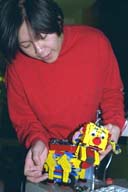
Franklyn Turbak of the Computer Science Department and Robbie Berg of the Physics Department have developed a new course at Wellesley College called Robotic Design Studio.
We believe that it is important to introduce liberal arts students to the essence of engineering. Toward this end we have developed Robotic Design Studio , a course where students learn how to design, assemble, and program robots made out of LEGO parts, sensors, motors, and small embedded computers. The course has no prerequisites and has attracted students from a wide range of backgrounds. The course culminates in a robot exhibition where students show off the robots that they have designed and built. These creative projects tie together aspects of a surprisingly wide range of disciplines. Robotic Design Studio represents an alternative vision of how robot design can be used to teach engineering in a way that is more inclusive and provides more room for artistic expression than contest-centered formats.
No prerequisites. 0.5 units of credit. NPS distribution requirement.
Robotic Design Studio has been offered for academic credit during WinterSessions of 1998, 1999, 2000, 2001, and 2002. (It is listed in the catalog as Physics 115 / Computer Science 115.)
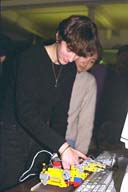
|
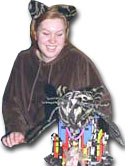
|
|
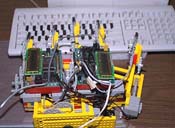
|
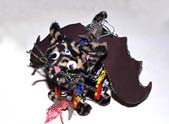
|
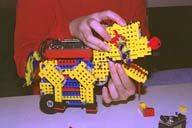
|
![]() Home
Page for the January, 2002 Course
Home
Page for the January, 2002 Course
![]() Robotic
Design Studio Museum - An on-line museum
of student robot projects created since January 1996.
Robotic
Design Studio Museum - An on-line museum
of student robot projects created since January 1996.
![]() SciBorg
- our first robot. On the first day of class, everyone gets a copy of a
SciBorg to play with. Detailed plans for constructing your own SciBorg are
posted at this link.
SciBorg
- our first robot. On the first day of class, everyone gets a copy of a
SciBorg to play with. Detailed plans for constructing your own SciBorg are
posted at this link.
![]() Colby
College Workshop - In October, 1997 Franklyn, Robbie, and a station
wagon full of robots headed north to lead a NECUSE sponsored workshop that
was attended by about 25 faculty and students from Colby, Bates, Bowboin
and Middlebury Colleges.
Colby
College Workshop - In October, 1997 Franklyn, Robbie, and a station
wagon full of robots headed north to lead a NECUSE sponsored workshop that
was attended by about 25 faculty and students from Colby, Bates, Bowboin
and Middlebury Colleges.
Robotic Design Studio was made possible by grants from the National Science Foundation (DUE-9650969), the Hughes Foundation, and Wellesley College.
PDF version of the Proposal Submitted to the NSF
